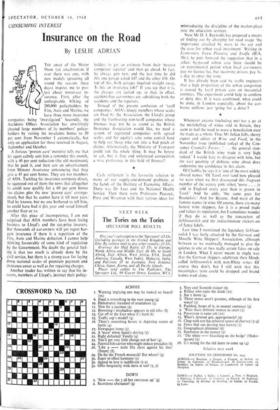Insurance on the Road
CONSUMING INTEREST
By LESLIE ADRIAN
A furious 'proven care' motorist tells me that his agent calmly sent him a reminder this month, with a 40 per cent reduction (the old maximum), that lie paid it, and then saw an advertisement front 'Minster Assurance announcing that they giVe a 45 per cent bonus. They are not members of AOA. Tackling his insurance company direct, he squeezed out of them the news that altogether he could now qualify for a 60 per cent bonus (no claims plus the new 'proven care' arrange- ment), but that he cannot have it till next year.• Had he known, but no one bothered to tell him, he could have had it this year and saved himself another fiver or so.
After this piece of incompetence, I am not surprised that AOA members have been losing business to Lloyd's and the cut-price insurers. But thousands of car-owners will yet regret bar- gain insurance if there is a repetition of the Fire, Auto and Marine defection. I cannot help" thinking favourably of some kind of regulation by the Government. No doubt the general feel- ing is that too much is already done by the civil service, but there is a strong case for laying down national scales of premium payment and insurance cover as well as for repairing charges.
Another reader has written to say that his in- surers, members of Lloyd's, instruct their policy-
holders to get an estimate from their 'nearest competent repairer' and then go ahead. In fact, he always gets two, and the last time he did this one garage asked £47 and the other £36. On top of this, both garages inquired straight away, 'Is this an insurance job?' If you say that it is, the charges are jacked up, so that, in effect, accident-free car-owners are subsidising both the accidents and the repairers.
Instead of the present confusion of 'tariff companies,' AOA's ninety members whose scales are fixed by the Association, the Lloyd's group and the freebooting non-tariff companies whose finances may not be as sound as the British Insurance Association would like, we need a system of registered companies with agreed scales, and for equity's sake some central fund to help out those who run into a bad patch of claims. Alternatively, the Ministry of Transport could run the whole thing. It may be heresy to ask, but is free and unfettered competition a wise preference in this field of finance?
*
Cash settlement is the favourite solution to many of our supply-and-demand problems at the hands of the Institute of Economic Affairs. There was Dr Lees and the National Health Service. Then there were Professors Peacock, Prest and Wiseman with their various ideas for reintroducing the discipline of the market-place into the education services.
Now Mr D. J. Reynolds has proposed a means of finding out by charging for road usage 'the importance attached by users to the car and the case 'for urban road investment.' Writing in Economics, Town Planning and Traffic (IEA, 30s.), he puts forward the suggestion that in a select, by-passed urban area there should be an experimental period when local car-owners pay no licence fee, but incoming drivers pay Is. a day to enter the zone.
It has already been said by traffic engineers that a high proportion of the urban congestion is caused by local private cars on inessential journeys. The experiment could help to confirm or deny this. If it were confirmed, what could be done, in London especially, about the car- borne millions just 'going for a drive'?
Whenever anyone (including me) has a go at the mislabelling of wines sold in Britain, they seem to feel the need to wave a benediction over the trade as a whole. Thus Mr Julian Jeffs, sherry expert and editor of Wine and Food, in the November issue (published today) of the Con- sumer Council's Focus: '. . . the general stan- dard of the British wine trade is very high indeed.' I would hate to disagree with him, but the vast quantity of dubious wine about does undermine my confidence in this claim.
Of Chablis, he says it is 'one of the most widely abused names.' Of Tavel rosé (and how pleased we were when we first discovered this fragrant member of the watery pink tribe), 'more . . . is sold in England every year than is grown in Tavel.' And he adds, 'the same goes for Beaujolais.' And for Beaune. And most of the famous names in wine. Of course, there are many honest wine shippers, for it is a proud trade and values its reputation, but I sometimes wonder if they do as well as the concocters of liebfraumilch and the indiscriminate stickers-on of fancy labels.
Last time I mentioned the legendary liebfrau- milch I was hotly attacked by the German and Moselle Wine Shippers' Asssociation, although between us we eventually managed to give the quietus to one or two really arrant fakes on sale in London. What I never meant to imply was that the German shippers adulterate their blends called liebfraumilch with non-Rhine wines. Of course they don't, but I still wish that this meaningless term could be dropped and brand names used alone.






































 Previous page
Previous page